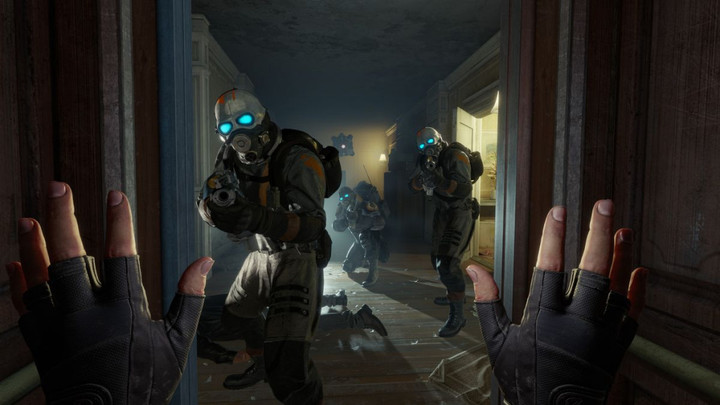So many huge announcements were made by flagship companies at the tail end of 2019, it’s easy to envision an all-out brawl across the industry.
It’s not just the trifecta of gaming giants beloved by the hardcore community – Valve, Riot and Activision-Blizzard – going up against one another with big moves, the jostling between the new consoles will also ensure a race for our attention in 2020. Who knows? If it all goes well, we might be looking at a new golden age – or, failing that, at least a pretty good time.
From Half-Life: Alyx, Diablo 4, Project A, Legends of Runeterra and other mysterious projects cooking in Riot’s cauldron, the alignment of announcements from these massive companies in the PC gaming space promises an epic confrontation for our eyeballs and wallets over the next few years - with possibly historic results.
In fact, "new Half-Life game" might be sat alongside "historic" in the dictionary at this point. Though it’s not quite the number three we’ve all been waiting for, it is nevertheless a long-awaited return to the world of City 17. There's potential for Valve to push the envelope in the world of VR too, much like how the first two Half-Life games became hugely influential on the first-person shooter genre in narrative and with the game-changing gravity gun.
In some ways, this kind of innovation is a necessity. Despite its boundless promise, VR remained an expensive toybox full of glitzy little experiments without a flagship title to its name. If the Half-Life franchise succeeds with this quantum leap, it could blow open the possibilities and attitudes towards VR. Conversely, if they fail, who else will try again with such a gargantuan project?
Though their prestige is tough to match, recent history is perhaps not on Valve’s side in this contest. In fact, their recent outings were surprisingly far off the mark. Artifact was a historic failure, Dota Underlords is lagging behind other titles in the genre and CS: GO Danger Zone mostly turned out to be a way-too-late afterthought in the world of battle royale.
Though it’s impossible to squander all the credit the company has accrued over its lifespan, another high-profile misstep would be pretty damaging, and these preludes make their project – perhaps surprisingly – the riskiest out of the ones we’ve discussed here.
Riot Games meanwhile will attempt to expand their foothold into more than just the MOBA genre. This year they announced seven new high-profile titles at the same time, which certainly shows confidence. Legends of Runeterra is already getting positive press – though maybe we should be careful with that after seeing how Artifact turned out – and with a shooter and a fighting game (at least) also in the works, they’ll likely be more than happy even if just one of these titles will reach League Of Legends, or TeamFight Tactics, levels or relevance.
Diablo 4 looks to be arriving next year (Picture: Blizzard)
At the same time, Activision-Blizzard has a lot of ground to make up, at least as far as customer goodwill is concerned. The Blitzchung controversy, the Diablo Immortals fiasco from last year’s BlizzCon and the wobbly nature of Overwatch esports didn’t do much to assuage concerns the developers are becoming more like their parent company as we get closer to the new decade.
However, Diablo 4 has long been the white whale of the ARPG community – even if it is so far away right now – and Overwatch 2, even if it isn’t quite worthy of the sequel tag, can easily turn out to be a shot in the arm for the franchise.
Then there’s the world of consoles, far from the prying eyes of the PC Master Race, and yet still a huge slice of the gaming pie. Nintendo’s sequel to Breath of the Wild, presumably out in 2020, will inevitably make the Switch an even more appealing device.
The war between the PlayStation 5 and the Xbox Scarlett could also change which company dominates the landscape - promising an exclusives-laden contest we’ve seen in the past between Sony and Microsoft. This time, the potential customer interest in VR consoles (which are, of course, on the pricey side) could further complicate matters.
From a player perspective, the fact all these companies are beginning to converge in terms of output should be very exciting news. Direct competition breeds innovation. Crucially, many of these companies are committed to the esports side of things – though with varying levels of success across their different titles – suggesting long-term lifespans and support for each. Admittedly, this likely won’t be the case for Valve and Half-Life: Alyx but the mere fact it’s the most high-profile VR title ever more than makes up for this in terms of potential relevance.
However you look at it, what’s in store for 2020 could easily be the widest slate of top-tier titles to come from elite developers primarily aimed at the hardcore crowd. With the console-focused market set for major shifts too, the sheer volume of huge projects on the horizon guarantees exciting times are certainly ahead.

 No ads, our video library,
No ads, our video library,


